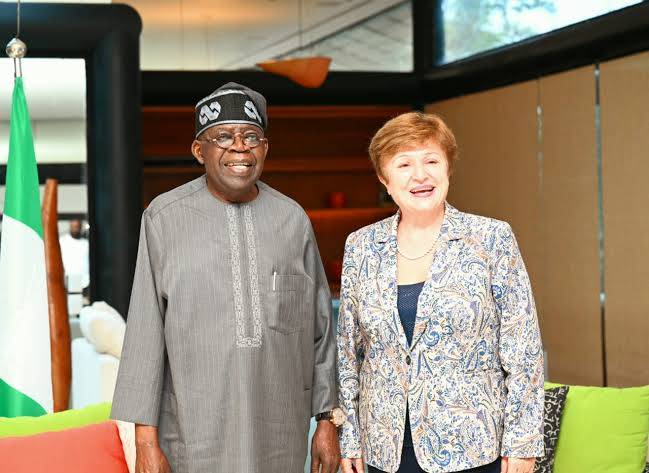Tinubu Vows To Prioritise Social Investment Programmes Amidst Reforms
President Bola Tinubu has acknowledged that the current economic reforms have weakened Nigerians' purchasing power, but has assured that his administration will prioritize social investment programmes to cushion the effects on the most vulnerable citizens.
Speaking during a meeting with Kristalina Georgieva, the Managing Director of the International Monetary Fund (IMF), President Tinubu emphasized the need to reduce the hardship resulting from the implementation of the economic reforms. He noted that the administration has started seeing positive results from the reforms, but acknowledged that more needs to be done to alleviate the suffering of the Nigerian people.
The President also stressed the importance of educational access, noting that Nigeria has too many children out of school. He emphasized that education is a way out of hunger and poverty, and that his administration is designing ways and incentives to keep children in school.
In addition to prioritizing social investment programmes, President Tinubu also announced that his administration is working on tax reforms to stimulate the economy further. He noted that the government is engaging stakeholders and sensitizing Nigerians to expand the economy's tax base for inclusive developmental growth.
The President's commitment to prioritizing social investment programmes is a significant step towards addressing the challenges faced by the most vulnerable Nigerians. The administration's focus on education, healthcare, and other social services is expected to have a positive impact on the lives of millions of Nigerians.
The IMF Managing Director, Kristalina Georgieva, commended President Tinubu's administration for its economic reforms and their positive indicators. She assured the President of the IMF's continued support in diversifying the Nigerian economy and promised to provide technical support for the budgeting process.
President Tinubu's administration has been working tirelessly to address the economic challenges facing the country. The government has implemented several reforms aimed at stimulating economic growth, reducing poverty, and improving the overall standard of living of Nigerians.
The economic reforms have had a significant impact on the country's economy, with Nigeria's GDP growth rate increasing significantly in recent years. However, the reforms have also had a negative impact on the purchasing power of Nigerians, with many citizens struggling to make ends meet.
In this context, President Tinubu's commitment to prioritizing social investment programmes is a welcome development. The administration's focus on education, healthcare, and other social services is expected to have a positive impact on the lives of millions of Nigerians.
As the administration continues to work towards addressing the economic challenges facing the country, it is essential that the needs and concerns of Nigerians remain at the forefront of the decision-making process. By engaging with citizens, civil society organizations, and other stakeholders, the government can ensure that its policies and programmes are responsive to the needs of all Nigerians.




No comments yet
Be the first to share your thoughts!